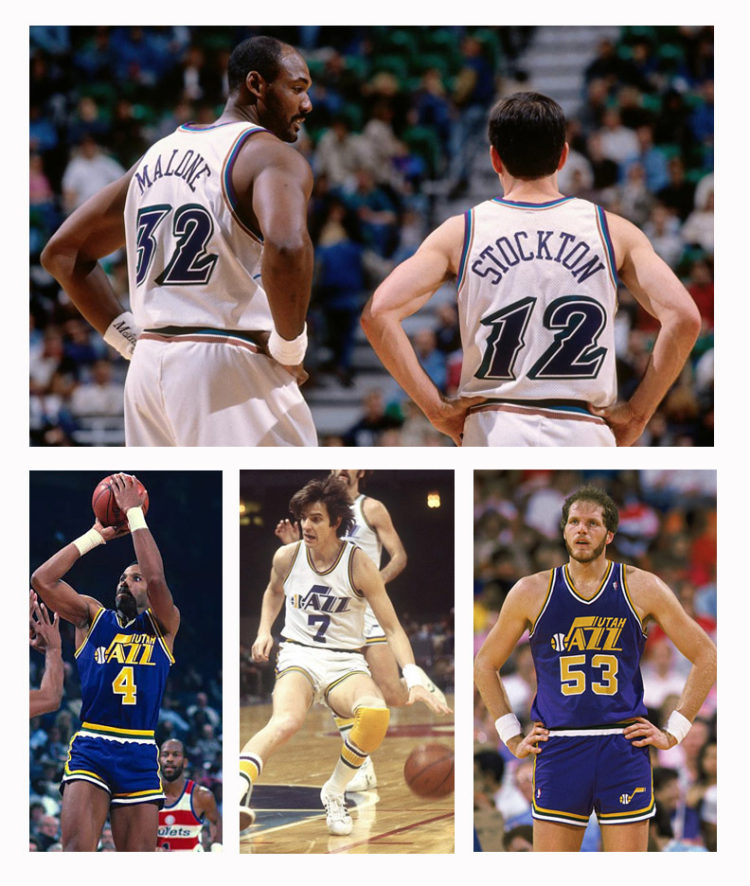With the Jazz in the midst of a playoff run and the 45th season of the franchise set to tip off in October, I thought it would be fun to put together an All-Time Jazz team, to recognize the top players in team history.
The All-Time Team consists of 12 players, like the All-Star Team. It includes five starters at each position, five bench players at each position, and two “wild card” players, who can play any position.
To be selected, a player must have played five seasons with the franchise, either in New Orleans or Utah. The player must also have had an impact on the franchise, either by individual accolades (All-Star, All-NBA, All-Defense, etc.) or via being a part of successful teams that made the playoffs, won their division, or made the NBA Finals.
So here it is, my picks for the All-Time Jazz Team.
Starters
PG: John Stockton (1504 games, 13.1 PPG, 10.5 APG, 2.7 RPG, 2.2 SPG)
The NBA’s all-time leader in assists and steals never missed the postseason in 19 seasons, while playing the most games in Jazz history.
The 10-time All-Star pick racked up 11 All-NBA selections during his career, while also being named All-Defense five times. Aside from numerous personal accolades, Stock was an ironman, missing a total of just 22 games (18 of which were during one season) over his entire career.
Stockton also led the Jazz to five division crowns and their only two NBA Finals appearances in franchise history, hitting “The Shot” that sent the Jazz to their first Finals in 1997.
Stockton is a unanimous choice for the All-Time Jazz Team. Bonus points for wearing the short shorts for the duration of his career.
John Stockton recreates ‘The Shot’ that sent the Utah Jazz to the 1997 NBA Finals
SG: Pete Maravich (330 games, 25.2 PPG, 5.6 APG, 4.3 RPG)
While nearly all of Maravich’s career with the Jazz came in New Orleans, he still left a large mark during the early days of the franchise.
Despite never making the postseason with the Jazz, “Pistol Pete” was the team’s first star, being selected for three All-Star teams and three All-NBA teams while leading the league in scoring during the 1976-77 campaign.
He also holds the Jazz single-game scoring record, netting 68 points versus the Knicks on February 25, 1977.
The Hall of Famer became the first Jazz player to have his jersey retired in 1985, and his early mark on the franchise cannot be understated.
SF: Adrian Dantley (461 games, 29.6 PPG, 6.2 RPG, 3.7 APG, 56.2 FG%)
Dantley owns the highest scoring average in Jazz history, while being a catalyst for the early playoff teams in Jazz history, including the first squad to make the postseason for the Jazz franchise (1984).
Aside from leading Utah to their first playoff appearance, AD also led the team to the first division title and playoff series win in team history during the 1983-84 campaign.
The six-time All-Star and two-time All-NBA selection led the league in scoring twice during his Utah tenure and was inducted into the Hall of Fame in 2008.
Dantley, the first star in the Utah era, is the easy pick as a starter on the All-Time Jazz.
PF: Karl Malone (1434 games, 25.4 PPG, 10.2 RPG, 3.5 APG, 1.4 SPG)
The second obvious choice as a starter on the All-Time Jazz, Malone is the NBA’s second all-time leading scorer who formed the most recognized point guard/power forward combo in league history.
“The Mailman” was selected for 14 All-Star games and 14 All-NBA teams while also being named to 4 All-Defensive teams and bringing home the All-Star Game MVP twice (co-winner in 1993 with John Stockton).
The two-time MVP is the other reason for the Jazz never missing the playoffs during his 18-year career in Utah, while appearing in two NBA Finals and winning five division titles.
The Hall of Famer and perhaps the best power forward in NBA history is a unanimous choice for the All-Time Jazz.
Center: Mark Eaton (875 games, 6 PPG, 7.9 RPG, 3.5 BPG)
One of the NBA’s premier shot blockers, the two-time Defensive Player of the Year holds the NBA career record for blocks per game, while also holding single season marks for blocks per game and total blocks.
The 1989 All-Star selection was selected to five All-Defensive teams and led the league in blocks four times, while playing his entire career with Utah.
Arguably the best center in team history, Eaton was on playoff teams the last 10 seasons of his career, including the first playoff team in franchise history in 1984.
Eaton’s No. 53 jersey hangs in the rafters at Vivint Smart Home Arena, but his starting spot on the All-Time Jazz Team might be in jeopardy soon with the emergence of Rudy Gobert.
Bench
PG: Deron Williams (439 games, 17.3 PPG, 9.1 APG, 3.2 RPG)
The backup to Stockton on the All-Time Jazz Team, Williams was one of the best point guards in the league during his prime, finishing in the top five in assists in his last four full seasons in Utah.
The two-time All-Star and two-time All-NBA Second team selection was a key part of the Jazz post Stockton & Malone, leading the team to its first playoff appearance of the new era.
D-Will made the playoffs the last four full seasons of his tenure, which included a trip to the Western Conference Finals in 2007.
Despite his controversial exit from Utah, Williams remains the second-best point guard in team history and an easy pick for the All-Time Jazz Team.
SG: Darrell Griffith (765 games, 16.2 PPG, 3.3 RPG, 2.1 APG, 1.2 SPG)
Griffith recorded one of the best rookie seasons in team history, rivaled only by Donovan Mitchell. For his outstanding rookie campaign, “The Golden Griff” was named to the NBA All-Rookie Team and received the Rookie of the Year award.
Griffith was a key member of the Jazz for his 11-year career and was the all-time leading scorer at the time of his retirement.
He was a large part of the first playoff team in Jazz history in 1984 and made the playoffs the last eight seasons of his career, helping lead the Jazz to Midwest Division titles in 1984 and 1989.
It was a toss-up between Griffith and Hornacek for this spot, but Griffith’s longer tenure wins out. A few years down the road though, we could see Donovan Mitchell in this spot.
SF: Andrei Kirilenko (681 games, 12.4 PPG, 5.6 RPG, 2.8 APG, 1.4 SPG, 2 BPG)
Kirilenko belongs on two all-time teams, the Jazz and the NBA Nickname Team. At least for now, lets focus on his basketball accolades.
AK-47 is one of the best all-around players to suit up for the Jazz and could do virtually everything on the floor. He was selected to the 2004 NBA All-Star team and was picked for three All-Defensive Teams as well as the All-Rookie Team in 2002. He even led the league in blocks during the 2004-05 campaign.
Kirilenko was a member of six Jazz playoff teams during his 10-year tenure; the last two during the Stockton/Malone era and the other four teaming up with Williams and Boozer, which included a run to the conference finals.
AK is a solid choice to lead the second unit on the All-Time Jazz, and for what it’s worth should have his jersey retired as well.
Andrei Kirilenko: Why The Former Utah Jazz All-Star Should Have His Jersey Retired
PF: Carlos Boozer (354 games, 19.3 PPG, 10.5 RPG, 2.9 APG)
The new power forward in the PG/PF combination of the post Stockton/Malone era in Jazz history, Boozer is possibly the biggest free agent acquisition in team history.
Boozer was named to two NBA All-Star teams in Utah and was selected to the All-NBA Third Team for his contributions during the 2007-08 season.
Boozer was another key piece of the 2006-07 Jazz that marched all the way to the conference finals in its first playoff appearance since the Stockton/Malone era. He also helped the Jazz to three other playoff appearances and a pair of Northwest Division titles during his tenure.
All in all, Boozer is a solid option to back up Malone on the All-Time Jazz.
Center: Rudy Gobert (325 games, 10 PPG, 10 RPG, 2.2 BPG)
Only five seasons into his career, Gobert has a chance to become the best center in team history.
After not playing much during his rookie season (9.6 MPG), Gobert has steadily improved each season to become one of the best centers in the NBA.
During the 2016-17 season, Gobert helped lead the Jazz to their first playoff appearance in five years while winning the Northwest Division and a first round series, while leading the league in blocks and being named to the All-NBA Second Team and All-Defensive First Team.
Despite losing Gordon Hayward during the offseason, “The Stifle Tower” has helped lead the Jazz back to the postseason this season, and with three years left on his current deal, Gobert has a chance to take Eaton’s spot in All-Time Jazz starting lineup.
Highlights: Rudy Gobert’s buzzer-beating tip-in gives Jazz a crazy overtime win over Kings
Wild Card: Mehmet Okur (474 games, 15.3 PPG, 7.6 RPG, 1.9 APG, 38.1 3 PT%)
Okur was really ahead of his time. A three-point shooter who is seven feet tall? It was basically him and Dirk doing it then, and now it’s basically a requirement for big men in todays league.
Okur is a fan favorite in Utah and was a large part of four straight Jazz playoff teams from 2007-10, which included two Northwest Division titles and a trip to the conference finals.
Okur was selected to the NBA All-Star team during the 2006-07 season and is one of the top shooters in franchise history.
Betrayed — Hayward’s Legacy Tarnished, Leaves Big Questions For Utah Franchise
Wild Card: Gordon Hayward (516 games, 15.6 PPG, 4.2 RPG, 3.4 APG)
Say what you will about his departure, Hayward is still one of the top players in Jazz history.
Hayward improved his numbers during each of his seven seasons in Utah and was selected to his first All-Star game during the 2016-17 season.
He helped lead the Jazz to the playoffs in 2012 and five years later led the Jazz back to the postseason, which included a division crown and a series win over the LA Clippers.
Other players considered: Thurl Bailey, Jeff Hornacek, Paul Millsap, Rickey Green
Stats current as of April 25, 2018 courtesy of Basketball Reference.
Follow Fan Insider on Facebook and on Twitter.
2018 NBA Playoffs: What The Top 16 Playoff System Would Look Like













[…] Utah Jazz: Ranking The Best Franchise Players Of All Time […]